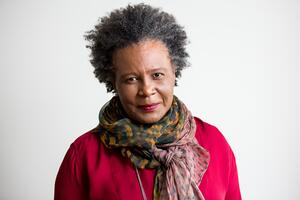CHAMPAIGN, Ill. — Poet Claudia Rankine, whose writing addresses issues of racism and racial violence, will visit campus this week to read from her work.
The reading is at 7:30 p.m. Wednesday at the Alice Campbell Alumni Center, 601 S. Lincoln Ave., Urbana, and is free and open to the public. The event is hosted by the Illinois Program for Research in the Humanities with co-sponsorship by the department of African American studies. Rankine’s visit is the final event for IPRH’s 2018-19 theme, “Race Work,” as well as a celebration of National Poetry Month.
"Claudia Rankine is a celebrated poet, teacher and leading advocate for social justice. Her challenge and voice have changed the dialogue about identity and race both in our national conversation and in creative writing programs," said Janice Harrington, a poet, an English professor and the director of creative writing for the English department.
"Many of us have read and reread her work, inspired by its inventiveness and deep human insight," Harrington said. "Her poetry takes risks, and she asks readers to take risks by looking at difficult topics, whether police violence, racial prejudice, or the boundaries of our racial perceptions. But most of all, she has taught us to have difficult, deeply needed conversations about who we are, and are not, as Americans."
Rankine is a professor of poetry at Yale University and the author of five collections of poetry, including “Citizen: An American Lyric” in 2014, which was a finalist for the National Book Award and won numerous awards, including the National Book Critics Circle Award in Poetry, the PEN Center USA Poetry Award and the T.S. Eliot Prize for Poetry.
Her play “The White Card” premiered in February and includes themes about racial divisions also present in “Citizen.” Rankine is a 2016 winner of a MacArthur Foundation Fellowship, and she used the prize money from the fellowship to establish The Racial Imaginary Institute, which promotes interdisciplinary work and collaborations that explore issues of race. She also was awarded a 2017 Guggenheim Fellowship.
“Rankine’s book ‘Citizen’ is a really powerful engagement with questions of race and violence against people of color. We felt she was an important voice we wanted to showcase,” said IPRH director Antoinette Burton.
“I think she is trying to leave an archival record of contemporary feeling about how race works and doesn’t work in the U.S.,” Burton said. “This is a really powerful American and African American voice at a very interesting, troubling, challenging moment in American history.”
IPRH has organized programs around the “Race Work” theme throughout the academic year, including a discussion of race and Brazilian politics; a performance by the Illinois Black Chorus; a symposium on race and the classics, organized with the classics department; a performance and talk with a dancer that focused on race and the creative economy; and a biweekly fellows seminar in which graduate students and faculty presented their work in progress related to the theme for discussion in an interdisciplinary setting.
“We’ve been trying to think about the labor of race, the work of race, not just in the contemporary U.S., but across time and space and disciplines,” Burton said. “Rankine’s visit is a culmination of a whole year of thinking about this in the context of ancient history, dance, music and the scholarship of our IPRH fellows. It’s a nice way of concluding the year, but we’re by no means done with the challenges of race work. It’s an ongoing project.”
Rankine also will meet with students Wednesday for an Inside Scoopconversation at the Bruce D. Nesbitt African American Cultural Center. Inside Scoop conversations allow undergraduate students to engage with humanities scholars up close over a lunchtime discussion.
